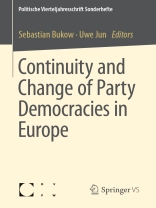This special issue of the German Political Science Quarterly addresses the transformation and the sustainability of European party democracies, both at the level of party organization as well as party systems and competition. The contributions in this volume are dedicated to these areas of change of European party democracies from different perspectives. It shows which new dynamics of change can be stated and how they can be explained.
Tabella dei contenuti
Party Democracies in Europe under threat?.- Why Parties Narrow their Representative Profile: Evidence from Parties in Six European Democracies.- ‘The Origins of Party System Polarization: How Parties and Voters Shape the Ideological Spread in Party Systems’.- The limits of cartelization: can parties cope with vulnerability?.- ‘What ‘moves’ party systems in times of crisis? .- Economic conditions, public opinion and party competition on European integration’.- From Brussels to the Capital: New Parties’ Paths into National Parliaments.- ‘More or less vulnerable?.- Variation in the extent to which mainstream political parties’ voters consider voting for radical right populist parties ‘.- Democracy Reform as a Populist Policy Supply.- Populist politicians: Populism, Democratic Dissatisfaction and the perception of representation. The case of Greece.- ‘No need for wider selectorates?.- Exploring selectorates’ preferences for choosing district and list candidates for the German Bundestag ‘.- ‘Oppositional Strategies Between Cooperation and Conflict: An Analysis of Opposition Party Voting in the German Bundestag, 1949-2013’.- ‘Friends and Foes: How Coalition Formats Shape Voters’ Perceptions of the Party System’.
Circa l’autore
Dr. Sebastian Bukow is Head of Politics and Party Research Division, Heinrich-Böll-Stiftung, Berlin.
Dr. Uwe Jun is Professor of Political Science (Political System of the Federal Republic of Germany) at the University of Trier.












